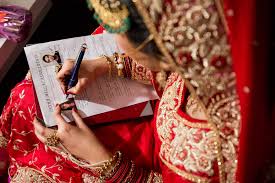
The Role of Nikah in Islam
The Role of Nikah in Islam: Understanding Its Importance in Muslim Matrimony In Islam, Nikah (Arabic: نكاح) refers to the sacred contract of marriage between a man and a woman. It is not just a legal or social bond but a deeply spiritual and religious commitment that holds significant importance in the life of every Muslim. The concept of Nikah is deeply embedded in the teachings of the Qur'an and the Hadith (sayings of Prophet Muhammad, peace be upon him), reflecting its central role in fostering strong family units and societal stability. What is Nikah? Nikah is the Islamic term for marriage and is seen as an act of worship. It involves both a legal contract and a spiritual commitment to live together in harmony, guided by the principles of Islam. The word "Nikah" literally means "to marry" or "to unite" in Arabic, symbolizing the union of two individuals with the intention of leading a life together in accordance with the laws of Islam. The Spiritual and Social Significance of Nikah in Islam Fulfilling a Religious Obligation: Marriage is considered a Sunnah (commendable practice) of the Prophet Muhammad (PBUH), and in some cases, it is even considered an obligation for those who are able to do so. It is a way to preserve chastity, maintain modesty, and protect individuals from unlawful desires. Prophet Muhammad (PBUH) encouraged marriage, saying: “Marriage is my Sunnah. He who turns away from my Sunnah is not of me.” (Sunan Ibn Majah) Strengthening the Family Unit: The family is the cornerstone of Islamic society, and Nikah is the foundation of the Muslim family. Marriage brings together two individuals who are expected to work together to create a loving, supportive, and nurturing environment for their children. The family is viewed as the primary institution for raising the next generation of Muslims with good values and strong morals. Completing Half of One’s Faith: Marriage in Islam is considered a means of completing one's faith. Prophet Muhammad (PBUH) said, “When a man marries, he has fulfilled half of his religion, so let him fear Allah regarding the remaining half.” (Al-Bayhaqi). This highlights the importance of marriage as a means to fulfill one’s religious and spiritual duties. A Source of Emotional and Physical Fulfillment: In Islam, marriage is not merely a social contract; it is viewed as a source of comfort, peace, and emotional support. The Qur'an describes the relationship between husband and wife as one based on love, mercy, and tranquility: “And of His signs is that He created for you from yourselves mates that you may find tranquility in them; and He placed between you affection and mercy. Indeed, in that are signs for a people who give thought.” (Qur'an, 30:21). A Legal and Ethical Commitment: Nikah is not just about love and companionship; it is also a contract that involves specific rights and responsibilities. Both spouses are expected to treat each other with respect, kindness, and fairness. A wife has the right to maintenance, security, and fairness, while the husband has the right to be respected and supported in his role as the head of the family. The Nikah contract ensures that both parties have clear rights and obligations toward each other. Maintaining Modesty and Avoiding Harām Relationships: Islam emphasizes the importance of modesty and chastity, both before and after marriage. Nikah offers a lawful and halal (permissible) way for a man and a woman to form a relationship and fulfill their desires in a way that is in accordance with Islamic principles. This helps to prevent premarital and extramarital relationships, which are considered harām (forbidden) in Islam. Nikah and the Role of Matrimonial Websites in Islam In the modern world, Muslim matrimonial websites, such as Nikah.com and other online platforms, have emerged as a helpful tool for Muslims to find a suitable partner for marriage. These platforms cater to individuals who are seeking a spouse with whom they can form a Nikah, keeping in mind the importance of shared faith, values, and cultural backgrounds. These matrimonial websites are beneficial in many ways: Convenience: They offer a practical way to find a spouse, especially for Muslims living in non-Muslim-majority countries or areas where meeting potential partners can be challenging. Focus on Compatibility: Many Muslim matrimony platforms focus on helping individuals find a partner based on factors such as religious observance, family values, educational background, and other personal preferences. This ensures that the relationship is built on a foundation of mutual respect and understanding. Respectful and Safe Environment: These platforms provide a secure and respectful space for Muslims to connect with one another, while adhering to Islamic values. Many sites provide tools for privacy, moderation, and halal communication between potential partners and their families. Facilitating the Role of Family: In Islam, family plays a central role in the marriage process. Matrimonial websites often allow users to involve their families in the process, either by allowing family members to help manage the profile or through the introduction of family representatives during discussions and meetings. Encouraging Halal Marriages: These websites emphasize the importance of pursuing a relationship for the purpose of marriage, not casual dating or short-term relationships. This aligns with Islamic principles, ensuring that interactions are respectful and in line with halal practices. Conclusion Nikah is one of the most important acts in Islam, signifying a sacred bond between a husband and wife, centered on love, mercy, and mutual respect. It plays a central role in forming strong, supportive families and maintaining the moral integrity of the individual and society. In today’s digital age, Muslim matrimonial websites like Nikah.com play a vital role in facilitating this process, offering a halal and safe way for Muslims to find a spouse who shares their values and faith. Ultimately, Nikah in Islam is more than just a contract; it is a sacred bond that strengthens one’s faith, fosters family unity, and upholds the moral fabric of society.
28th November, 2024